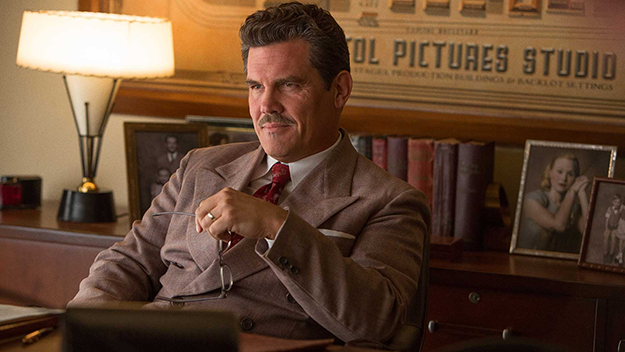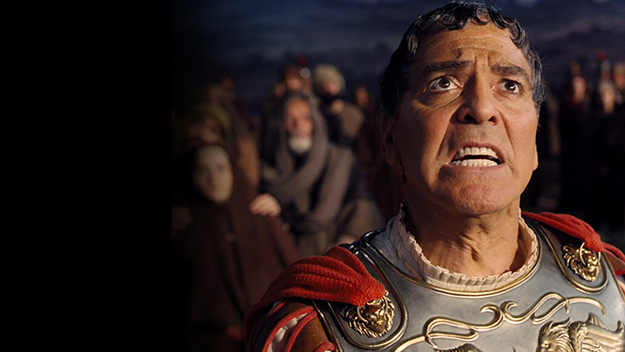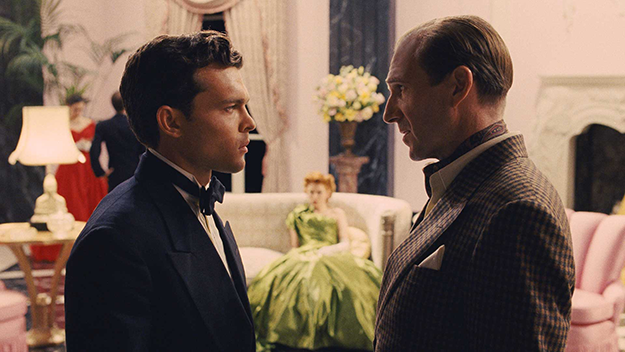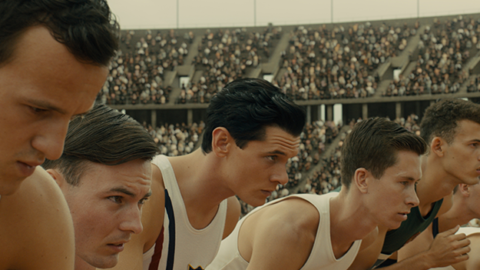Deep Focus: Hail, Caesar!

Laughs arrive in Hail, Caesar! like the periodic whoosh of intermittent wipers. Whenever hazy ideas and half-fermented humor fog up the screen, a blast of hilarity whisks them away. But as anyone stuck on a freeway during a rainstorm can testify, that on-and-off rhythm can get old quickly during an hour-and-45-minute ride. The Coen Brothers’ surprisingly perfunctory burlesque of Hollywood takes place in the early 1950s, when the movies had already lost regular customers to television and studios were no longer formidable trusts. As the Coens guide us through a fictional dream factory, “Capitol Pictures” (also featured in their condescending and morose Barton Fink), nostalgic fantasy and frivolous satire create a peculiar glow, then cancel each other out.
This movie frequently resembles a mash-up of second-tier Mel Brooks spoofs. The action flits in and out of Capitol’s alleys and corridors and onto the sets of the singing cowboy Western Lazy Ol’ Moon, the sailors’ shore-leave musical No Dames, the urbane farce Merrily We Dance, an aquatic spectacle echoing Neptune’s Daughter, and the Roman epic Hail, Caesar!
It’s as if the Coens were desperately trying to fill out a thin premise—the kidnapping of Capitol’s biggest star, Baird Whitlock (George Clooney), while he’s playing a Roman officer in Hail, Caesar!—with every fond notion or parody they hatched watching Golden Age movies on TV. Too often, though, they simply re-create bits and pieces of outlandish genres and do them just a tad more broadly, hoping exaggeration alone would do the trick.

Channing Tatum has mastered the athletic leaps and lifts he needs to be persuasive as Burt Gurney, Capitol’s version of Gene Kelly. But the choice moments in his tap dance—the high points of the movie—devolve into disposable homoerotic jokes, like framing Gurney’s head above the crotch and between the legs of an upside-down male partner. And the Coen Brothers’ mock Esther Williams musical pales before the Busby Berkeley–choreographed insanity of the real thing. Scarlett Johansson is sensational as Capitol’s earthy, pregnant, currently unmarried swimsuit queen. It’s too bad that her role peaks when she mouths double-entendres to Jonah Hill as the studio’s most reliable go-to guy—or fall guy.
The movie’s unlikely hero is a fictional, idealized version of Eddie Mannix, the top executive troubleshooter at MGM who coddled and disciplined studio talents, negotiated with unions, and, with the help of publicity chief Howard Strickling, controlled celebrity scandals. The real Mannix, a Jersey boy who started at MGM as a bodyguard for its New York–based president, Nick Schenck, was tough, connected, hard-drinking, twice-married, and much-bedded. “Eddie had the manners of a police chief,” screenwriter Millard Kaufman recalled, “superficially jovial, but turn around and he could put a bullet in your ass. He was phenomenal in making the most of any situation.”
Allen Coulter’s Hollywoodland (06) presented Mannix as a man who was conceivably harsh enough to order the murder of George Reeves (TV’s Superman) at the request of his second wife Toni, who had been Reeves’s longtime mistress. (It’s one of several theories that Hollywoodland puts forward to account for Reeves’s gunshot death, officially ruled a suicide.) Nothing salacious sticks to Mannix in Hail, Caesar! The Coens transform him into a mid-century paragon—devoted husband and father, devout Roman Catholic, and 24-hour-a-day crusader for Capitol Studios and his unseen boss Nick Schenck. Josh Brolin plays Mannix with gravelly aplomb. Though he’s the straight man for the rest of the movie, he doesn’t settle for deadpan. He assumes a dogged, heightened normality that gives off an amiable buzz as he performs outlandish tasks. These include ordering a cultivated director (Ralph Fiennes) to accept a cowboy star (Alden Ehrenreich) as the lead in a drawing-room comedy and asking a multi-faith group of religious leaders to sign off on the script for Hail, Caesar!—a movie that looks like Quo Vadis but plays like Ben-Hur and carries the same subtitle: “A Tale of the Christ.”

By now, the Coen Brothers are reflexively called “quirky.” The only perverse thing about this movie, though, is that it salutes a company man. Brolin has told interviewers that the Coens’ Hail, Caesar!, not Capitol Pictures’, is the real tale of the Christ, with Mannix as Christ and Schenck as the unseen God-the-Father who commands him. (Viewing Schenck as the Old Testament deity makes him the one Jewish force in the movie.) Even so, this Christ doesn’t preach turning cheeks, but slapping them. With his open hand Mannix hits starlets as small as Gloria DeLamour (Natasha Bassett), for posing for French postcards, and stars as big as Clooney’s Whitlock—a cross between Clark Gable and Robert Taylor—for disrespecting Schenck. To my eyes, Mannix is more like the converse of another favorite Coen character, the Wizard of Oz. No one thinks he’s a wizard, but he is. Without anyone recognizing his sorcery, he forces compromises on filmmakers that work like magic, and he cajoles his stars into relationships that make them seem more virtuous or glamorous.
How wondrous strange! The Coen Brothers lionize a manipulative executive while depicting artists and entertainers as if they were children who need to be kept in line. Is that how they see themselves, or their peers? Even the Hollywood Communists are juvenile, cartoon narcissists. They’re convinced that the capitalist (or Capitolist) system is exploiting them, though it pays them lavishly, and they’re inordinately proud that they’ve smuggled Marxist messages (or so they think) into little-guy-against-the-system movies. The Coens’ irreverence can be refreshing: the Communist study group is periodically droll, especially when David Krumholtz spews out an anti-capitalist epithet like “parasite.” (It’s ludicrously flagrant, even for a travesty like this one, that an academic named Professor Marcuse, as in Herbert, advocates revolutionary action.) But the Coens are too proud of this kind of silliness. Godard called the generation he chronicled in Masculin Feminin “the children of Marx and Coca-Cola.” In this cartoon mode, the Coens are the children of Marshall McLuhan and Dr. Pepper. They confuse media-saturated frivolity with wild, creative individualism. Too frequently, all they achieve is an unleavened levity.
The Coens and their production team, including master cinematographer Roger Deakins, meticulously reconstruct the look of Quo Vadis. But the kidnap farce they come up with doesn’t equal the real movie’s tragicomic preproduction story. When John Huston fought with Louis B. Mayer about his vision for Quo Vadis, he wasn’t merely being temperamental. Huston, as he wrote in his memoir, An Open Book, wanted to portray “Nero and his fanatical determination to eliminate the Christians in much the same manner as his historic counterpart and fellow madman, Adolf Hitler, tried to destroy the Jews two thousand years later.” Of course, Mervyn LeRoy, not Huston, ended up making Quo Vadis in the manner of Hail, Caesar! (“A dreadful spectacle,” Huston muttered.) Huston’s conflict with Mayer has greater satirical potential than any argument that finds its way into the Coen Brothers’ Hail, Caesar! Huston described Mannix as “a bull of a man known for his terrible rages,” then commented, insultingly, he “was known as the minister without portfolio—a description [Mannix] never understood.” The Coens ignore independent-minded filmmakers like Huston and instead bow down to Mannix. Yet the movies they quote as they flesh out Mannix’s saga—classics like Howard Hawks’s The Big Sleep and Alfred Hitchcock’s North by Northwest—were made by maverick auteurs, not studio hacks.

The Coens keep a clownish distance from their material. Their take on Golden Age Hollywood—the era that propelled Neal Gabler to write “An Empire of Their Own: How the Jews Invented Hollywood”—turns out to be their most deracinated movie. In reality, Jewish studio heads like Mayer vetted Biblical movies with Christian authorities partly because the moguls feared the reaction of censors who already thought they were, in the words of Production Code chief Joseph Breen, “probably, the scum of the earth.” But in the Coens’ movie, Judaism and anti-Semitism aren’t an issue. All we see is the religion-obsessed Catholic, Mannix, meeting with Protestant, Catholic, Eastern Orthodox, and Jewish clergymen. It’s a funny colloquy—Mannix expects notes on Jesus, but the Eastern Orthodox priest immediately suggests strengthening the chariot race. The rabbi declares that his religion forbids any visual representation of “the godhead,” then decides it doesn’t matter because Jews don’t believe in the divinity of Jesus anyway. (The Coens love the “godhead” gag so much that they play it again in the final credits.) But the scene doesn’t dig any deeper than many jokes that begin, “A priest, a rabbi, and a pastor walk into a bar….”
The moviegoing kids that live within the sardonic hides of the Coen Brothers must enjoy the clever simplifications and tidiness of high-end studio product from the ’30s and ’40s. That’s what they emulate—disastrously, I think—in their reductive screenplays for Unbroken and especially Bridge of Spies, with its repeated references to a parable about an indomitable man, or “standing man,” and its strained comic catchphrase, “Would it help?” (“Aren’t you worried?” “Would it help?”). In Hail, Caesar! the Coens laud Mannix’s just-get-the-job done ethos and creative short-cuts as if they really were means to artistic ends. It’s an earthbound whimsy, and not even the Coens can make it float.
In this cockeyed yet conventional vision, the simplest characters come off best. Frances McDormand is brilliant in her one-scene role as a film editor whose dedication is almost suicidal. (She’s like a latter-day Dickensian caricature.) Tilda Swinton brings glittering high style to the low antics of twin sisters who are also rabid, rival gossip-hounds. Fiennes is uproariously subtle as a British director consumed by sophisticated craft—and Ehrenreich tops him as the earnest singing cowboy who becomes his reluctant drawing-room star. Ehrenreich is witty enough to emphasize the razor-sharp instincts and wiliness of his Wild West innocent, as well as his clumsiness. He also clicks with Veronica Osorio, who is charming as a youthful Carmen Miranda type—they’re a match made in Pop heaven. Only Clooney is disappointing: his comic attitude is forced as Whitlock, a born true believer just as willing to spout Marxist dogma off-screen as he is to voice Christian faith onscreen.
Even when it’s pleasant to watch, Hail, Caesar! is forgettable. I guess it’s hard to make a work of genius when you set out to genuflect before “the genius of the system.”
Michael Sragow is a contributing editor to FILM COMMENT and writes its Deep Focus column. He is a member of the National Society of Film Critics and the Los Angeles Film Critics Association.







